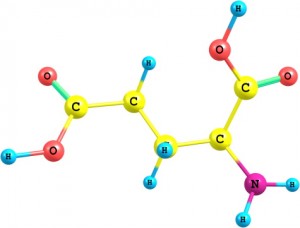Glutamate
 Glutamate (the salts of the amino acid glutamic acid) acts as a neurotransmitter in the brain. It carries nerve signals across a synapse by activating receptors on the postsynaptic nerve. It is an excitatory neurotransmitter, which means that it increases the likelihood that a nerve cell will fire an action potential. Out of all the transmitters in the brain, glutamate is the most important for normal brain function. Aside from being the most abundant excitatory neurotransmitter, it also plays important roles in learning and memory.
Glutamate (the salts of the amino acid glutamic acid) acts as a neurotransmitter in the brain. It carries nerve signals across a synapse by activating receptors on the postsynaptic nerve. It is an excitatory neurotransmitter, which means that it increases the likelihood that a nerve cell will fire an action potential. Out of all the transmitters in the brain, glutamate is the most important for normal brain function. Aside from being the most abundant excitatory neurotransmitter, it also plays important roles in learning and memory.
What Does Glutamate Do?
Glutamate’s main function is to transmit information that regulates brain development and determines cellular survival. Glutamate is present throughout the brain in high concentrations, but too much glutamate, as well as too little glutamate, can be dangerous. There must be exactly the right concentration in the correct location of the brain and for the proper length of time for processes to be carried out without cell damage.
Because glutamate is also an amino acid that makes proteins and performs metabolic functions, it was not immediately recognized as a neurotransmitter. Glutamate can enable long-term potentiation, which is the strengthening of signals between two neurons that occurs with frequent use. This process is associated with neuroplasticity, and because of glutamate’s role in this function, it heavily influences cognition, learning, and long-term memory, and to a lesser extent, spatial memory.
Glutamate in the Diet
Foods high in protein—meats, dairy, eggs, cheese, and high-protein vegetables—all contain high levels of glutamic acid. Glutamate is also commonly used as a flavor enhancer in the form of monosodium glutamate (MSG). MSG activates flavor receptors for umami, a savory, salty flavor that is one of the five basic human tastes. MSG is commonly added to prepackaged foods such as potato chips, as well as some Asian foods. MSG is also naturally present in relatively large proportions in breast milk.The flavor of MSG can make food more appealing, though there have been claims that it is addictive. Its use as a flavoring agent is controversial, as some people have reported headaches and other neurological problems immediately after consuming MSG. However, the U.S. Food and Drug Administration considers MSG safe, and studies generally indicate that, while some people may be sensitive to MSG, it is not connected to long-term neurological problems.
Glutamate Toxicity
Glutamate can damage nerve cells in the brain in two ways. If there is too much glutamate present, the nerve cell receiving its signals can become overexcited. The other scenario occurs when the receptor cell is oversensitive, requiring fewer molecules to excite it, and can therefore become overexcited by the normal amount of glutamate. These overexcited cells can become permanently damaged and die.
Sensitivity of receptor cells to glutamate is a characteristic of Huntington’s, as even low levels of glutamate can be toxic to some people with the condition. Thus, slowing glutamate activity in these individuals may be somewhat therapeutic. Amyotrophic lateral sclerosis (ALS), on the other hand, is characterized by elevated levels of glutamate. Although there is no cure for ALS, riluzole, a drug that controls glutamate levels, has been proven to slow its progress.
References:
- Audesirk, T., Audesirk, G., & Byers, B. E. (2008). Biology: Life on Earth With Physiology. Upper Saddle River, NJ: Pearson Prentice Hall.
- Danbolt, N. (2001, January 1). Glutamate as a Neurotransmitter. Retrieved from http://www.neurotransporter.org/glutamate.html
- Glutamate. (2014, January 1). Retrieved from http://www.alsa.org/research/about-als-research/glutamate.html.
- Tan, E. (2001, September 22). About Glutamate Toxicity. Retrieved from http://web.stanford.edu/group/hopes/cgi-bin/wordpress/2011/06/about-glutamate-toxicity.
- The Facts on Monosodium Glutamate. (n.d.). European Food Information Council. Retrieved from http://www.eufic.org/article/en/artid/monosodium-glutamate/
Last Updated: 05-24-2017
- 3 comments
- Leave a Comment
Robert
July 5th, 2017 at 2:39 PMVery interesting article. I had no idea that Glutamate played such a large part. MSG gives me headaches. However I will try to eat the foods mentioned here. I am 60 now and my diet has changed because my wife is disabled and can’t cook anymore so I mostly eat ham, turkey or roast beef sandwiches and chocolate.
Kimberly
October 18th, 2019 at 1:05 PMI crave proteins and have always wondered why. I’ve told my doctors and they think it’s a mineral deficiency and have ran many blood test. This information makes a lot of sense as to why my memory has been so foggy as well. Good article
SUSAN
August 11th, 2021 at 3:08 AMCould you comment on L-theonine, an amino acid found primarily in green tea, said to be similar chemically to glutamate. Any studies relevant to toxicity, effective use?
Leave a Comment
By commenting you acknowledge acceptance of GoodTherapy.org's Terms and Conditions of Use.
